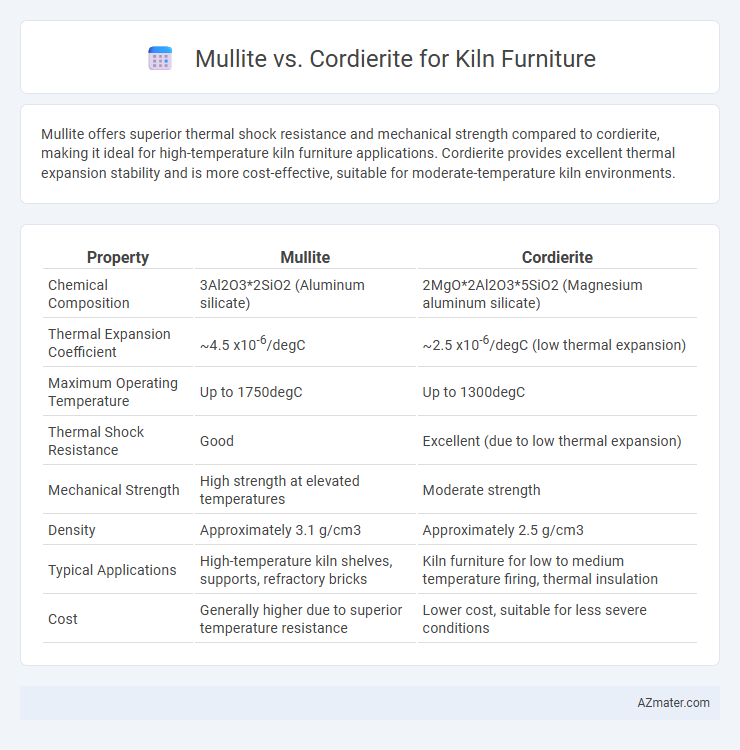Mullite offers superior thermal shock resistance and mechanical strength compared to cordierite, making it ideal for high-temperature kiln furniture applications. Cordierite provides excellent thermal expansion stability and is more cost-effective, suitable for moderate-temperature kiln environments.
Table of Comparison
| Property | Mullite | Cordierite |
|---|---|---|
| Chemical Composition | 3Al2O3*2SiO2 (Aluminum silicate) | 2MgO*2Al2O3*5SiO2 (Magnesium aluminum silicate) |
| Thermal Expansion Coefficient | ~4.5 x10-6/degC | ~2.5 x10-6/degC (low thermal expansion) |
| Maximum Operating Temperature | Up to 1750degC | Up to 1300degC |
| Thermal Shock Resistance | Good | Excellent (due to low thermal expansion) |
| Mechanical Strength | High strength at elevated temperatures | Moderate strength |
| Density | Approximately 3.1 g/cm3 | Approximately 2.5 g/cm3 |
| Typical Applications | High-temperature kiln shelves, supports, refractory bricks | Kiln furniture for low to medium temperature firing, thermal insulation |
| Cost | Generally higher due to superior temperature resistance | Lower cost, suitable for less severe conditions |
Introduction to Kiln Furniture Materials
Mullite and cordierite are essential kiln furniture materials known for their high thermal stability and resistance to thermal shock, making them ideal for kiln shelves and supports. Mullite offers superior refractoriness and mechanical strength at elevated temperatures, while cordierite is prized for its low thermal expansion and excellent thermal shock resistance, reducing the risk of cracking during rapid temperature changes. Choosing between mullite and cordierite depends on specific kiln firing conditions, including maximum temperature, heating cycles, and load-bearing requirements.
What is Mullite?
Mullite is a high-temperature aluminosilicate ceramic known for its exceptional thermal stability, mechanical strength, and resistance to thermal shock, making it ideal for kiln furniture in industrial firing processes. It typically contains about 3Al2O3*2SiO2, providing superior structural integrity and longevity under continuous high heat conditions compared to cordierite. Mullite's low thermal expansion and high melting point (around 1840degC) ensure consistent performance in demanding kiln atmospheres, enhancing the durability and efficiency of kiln shelves and supports.
What is Cordierite?
Cordierite is a magnesium iron aluminum cyclosilicate mineral known for its excellent thermal shock resistance and low thermal expansion, making it ideal for kiln furniture in high-temperature ceramic applications. Its ability to withstand rapid temperature changes without cracking extends the lifespan of kiln shelves and supports. Compared to mullite, cordierite offers better resistance to thermal cycling but typically has lower mechanical strength and refractoriness.
Thermal Properties: Mullite vs Cordierite
Mullite exhibits a higher melting point around 1840degC and excellent thermal shock resistance, making it ideal for high-temperature kiln furniture applications. Cordierite offers superior thermal expansion stability with a low coefficient of thermal expansion (approximately 2-3 x 10^-6 /degC), reducing the risk of cracking during rapid temperature changes. Comparing thermal conductivity, mullite generally has higher thermal conductivity (approximately 5-6 W/m*K) than cordierite (around 2 W/m*K), influencing heat distribution efficiency in kiln environments.
Mechanical Strength Comparison
Mullite exhibits superior mechanical strength compared to Cordierite, making it more resistant to deformation and thermal shock under high kiln temperatures. With a higher modulus of rupture, Mullite can withstand greater mechanical loads and prolonged thermal cycling without cracking. In contrast, Cordierite offers moderate strength but excels in thermal shock resistance due to its low thermal expansion, making it suitable for specific kiln furniture applications requiring flexibility.
Thermal Shock Resistance
Mullite exhibits superior thermal shock resistance compared to cordierite due to its higher mechanical strength and lower thermal expansion coefficient, making it ideal for rapid temperature changes in kiln furniture. Cordierite, while thermally stable, has a slightly higher thermal expansion, increasing the risk of cracking under thermal shock conditions. Kiln furniture applications demanding frequent temperature cycling often favor mullite for its enhanced durability and reduced fracture rates.
Performance in High-Temperature Environments
Mullite exhibits superior thermal shock resistance and stability at temperatures above 1750degC, making it ideal for high-performance kiln furniture applications. Cordierite offers excellent thermal expansion properties and energy efficiency but is typically limited to use below 1300degC due to its lower melting point. Mullite's durability in extreme environments ensures longer service life and reduced maintenance costs in industrial kiln operations.
Cost and Availability
Mullite kiln furniture typically costs more than cordierite due to its higher purity and superior thermal stability, making it ideal for high-temperature applications. Cordierite is generally more affordable and widely available, favored for its excellent thermal shock resistance and suitability in moderate temperature ranges. Availability of cordierite kiln furniture is more consistent globally, whereas mullite products can be limited depending on regional manufacturing capabilities.
Typical Applications in Kiln Furniture
Mullite kiln furniture is predominantly used in high-temperature applications such as ceramic firing and glass processing due to its excellent thermal shock resistance and high melting point around 1840degC. Cordierite kiln furniture, favored for its low thermal expansion and good thermal shock resistance up to 1300degC, is typically applied in heat treatment and semiconductor manufacturing processes. Both materials serve crucial roles in supporting delicate ceramic ware during firing, with Mullite suited for more extreme thermal environments while Cordierite is optimal for medium-temperature applications requiring durable thermal stability.
Choosing the Right Material for Your Kiln
Mullite and cordierite are two primary materials used for kiln furniture, each offering distinct thermal properties and durability. Mullite provides superior thermal shock resistance and higher mechanical strength, ideal for high-temperature applications exceeding 1400degC, while cordierite excels in insulation efficiency and cost-effectiveness, suitable for moderate temperatures around 1200degC. Selecting the right material depends on your kiln's maximum operating temperature, required thermal stability, and budget constraints to ensure optimal performance and longevity.

Infographic: Mullite vs Cordierite for Kiln furniture
 azmater.com
azmater.com